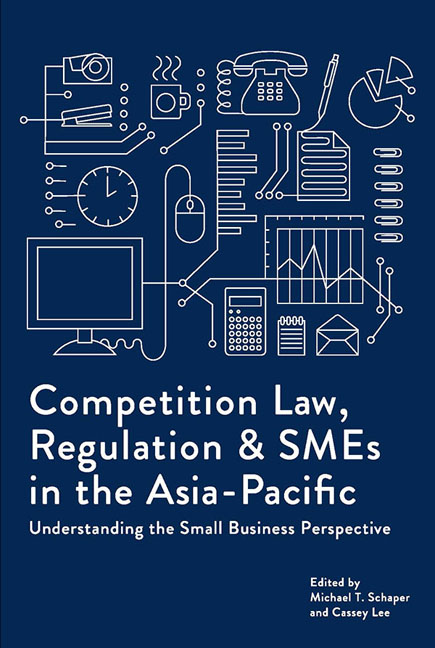 Competition Law, Regulation and SMEs in the Asia-Pacific
Competition Law, Regulation and SMEs in the Asia-Pacific Book contents
- Frontmatter
- Contents
- Foreword
- About the Contributors
- 1 Introduction: Making the Invisible SME More Visible in Competition Policy and Law
- Section 1 Theories And Basic Concepts
- Section 2 Smes And Competition Law
- 7 The Application of Per Ses to Smes: The Type 1 Error No One Notices?
- 8 Enforcing Competition Law Against SMEs: Presumptions and Problems
- 9 How Competition Law May Affect Franchised Smes in Apec Economies
- 10 Chinese Family Firms in Southeast Asia: Special Problems for Competition Law?
- 11 Trade Associations: Competition Law Advocates or Offenders?
- Section 3 Country Studies
- Index
10 - Chinese Family Firms in Southeast Asia: Special Problems for Competition Law?
from Section 2 - Smes And Competition Law
Published online by Cambridge University Press: 05 August 2017
- Frontmatter
- Contents
- Foreword
- About the Contributors
- 1 Introduction: Making the Invisible SME More Visible in Competition Policy and Law
- Section 1 Theories And Basic Concepts
- Section 2 Smes And Competition Law
- 7 The Application of Per Ses to Smes: The Type 1 Error No One Notices?
- 8 Enforcing Competition Law Against SMEs: Presumptions and Problems
- 9 How Competition Law May Affect Franchised Smes in Apec Economies
- 10 Chinese Family Firms in Southeast Asia: Special Problems for Competition Law?
- 11 Trade Associations: Competition Law Advocates or Offenders?
- Section 3 Country Studies
- Index
Summary
Asian business is different in Southeast Asia. Chinese family companies dominate both big business and small, using organizational forms and practices, such as family conglomerates, that differ from those in the United States and Europe. Little research has been undertaken into the possible anti-competitive effect of such structures. This chapter examines some of these differences and discusses the implications for competition law.
Introduction
Chinese family companies are a major influence in Southeast Asian economies. While family-owned companies dominate small business, as they do in other countries, what is unusual about Southeast Asia is that family companies also dominate big business. Big enterprises in Asia are not the large-scale firms run along Western lines, but rather a conglomeration of small and medium-scale enterprises in a variety of markets that are often not even remotely related (see, for example, Gomez and Jomo 1999). In a (now dated) survey of corporate ownership by the World Bank following the Asian Financial Crisis in 1997, Claessens et al. (2000) examined the ownership of almost 3,000 Asian companies and found that a high proportion were family controlled; these firms, in turn, controlled a large part of many Asian economies. For example, the top ten families in Thailand controlled about 46 per cent of assets, whilst their counterparts in Indonesia control an even larger proportion — about 58 per cent (see Table 10.1).
What is perhaps surprising is the high concentration of top family assets irrespective of the level of a country's development or its legal or political system. One likely explanation is the importance of elite patronage networks that not only connect businesses but also link businesses and governments, which are then used to obtain monopoly and other competition-restricting concessions. Business goals and firm characteristics are also important. Family-owned businesses, big or small, may put the interests of the family ahead of profitability, which can have implications for competitive conduct — a family business may be more concerned with preserving the business (to employ family members and to ensure proper succession) and so sustain losses for extended periods of time which may drive even more efficient competitors out of business. Or networks can be used to prevent new entry.
- Type
- Chapter
- Information
- Competition Law, Regulation and SMEs in the Asia-PacificUnderstanding the Small Business Perspective, pp. 175 - 191Publisher: ISEAS–Yusof Ishak InstitutePrint publication year: 2016


